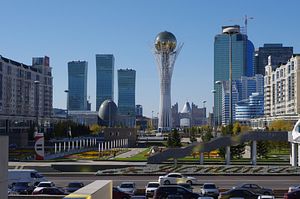When the Peace Corps shuttered its operations in Kazakhstan in 2011, rumors abounded. Stories of rampant beatings and sexual assault. Tales of agents from the KNB — Kazakhstan’s successor to the Soviet-era KGB — harassing volunteers. Cases of governmental meetings ignored and apartments broken into by authorities, all backgrounded by Kazakhstan’s first brushes with Islamist terror.
Officially, the reasons for Peace Corps Kazakhstan’s closure centered around the country’s development. Shutting down Peace Corps operations, Kazakhstan’s education ministry said at the time, was a “logical step,” pointing to Kazakhstan’s economic and infrastructural expansion. The argument carried certain merits. While the country was hardly close to reaching the trilingual goals Astana had set forth — goals Peace Corps volunteers were there to help achieve — Kazakhstan was far more developed than its Central Asian counterparts.
But a series of new documents The Diplomat obtained via a FOIA request casts doubt on Astana’s justifications for the Peace Corps’ departure, and confirm a handful of the reasons that bounced among conversations between volunteers — of which I was one. While many of the 178 pages obtained are redacted, the series of emails and documents shed a bit more light on the program-wide difficulties the Peace Corps faced from recalcitrant Kazakhstani officials, as well as the on-the-ground violence volunteers experienced.
For instance, in a January 2012 “Decision Memorandum,” then-Peace Corps Director Aaron Williams describes “local education authorities continu[ing] to provide only limited support for Volunteers and counterparts … Issues included lack of support for regional teacher trainings, and pressure on schools from local government security officials not to host[.]” (A separate document also notes that a “[c]onsiderable number of [Kazakhstani] State agencies which have been threatened by [the] KNB … will not be willing to hire former Peace Corps employees.”) Williams cites Kazakhstan’s northern regions specifically, where, by the end of the Peace Corps’ 18-year tenure in Kazakhstan, multiple oblasts had already shuttered operations.
According to Williams’ letter, interactions with Kazakhstani governmental officials were also concerning. Following Astana’s request for higher levels of professional certifications for volunteers, “[a]ttempts to engage with the Ministry of Education … on this issue were unsuccessful.” The Peace Corps country director “made several direct inquires about the 2012-2013 school year, and requested consultations about the qualifications of education Volunteers. In response, the Ministry only provided an assurance that the Volunteers already placed in schools for the 2011-2012 academic year would be allowed to finish that year.”
However, as the documents illustrate, a lack of receptivity from local officials was not the only factor in the program’s closure. While much of the sensitive information pertaining to assaults, both physical and sexual, experienced by volunteers is redacted in the documents, an October 30, 2011, letter contained within the documents helps shine a bit of light on the rate of violence.
Written by the parent of one of the volunteers in Kazakhstan, the letter says that the “situation in Kazakhstan has now reached the point where decisive action must be taken if [Peace Corps officials] are to safeguard the volunteers from further harm.” According to the letter, volunteers had been victims of at least one sexual assault or rape per month over the preceding six months, “at least a 500 percent increase over” the year prior. The letter also points to “growing reports in the [Kazakhstani] media that the Peace Corps volunteers are in essence spies of the U.S. government,” citing the country director’s prior correspondence. (Russia shut down Peace Corps operations nearly a decade prior, citing espionage as a factor.)
“Sadly, there are clear signs that the Peace Corps is no longer welcome in Kazakhstan,” the parent wrote, adding that “the time for working on solutions to stabilize the situation in Kazakhstan has long passed and now the volunteers are clearly in harm’s way.”
A few weeks after the letter was written, the Peace Corps evacuated its volunteers from the country. Shortly thereafter, Kazakhstan– which, according to the World Bank, now has a smaller GDP than it maintained in 2011 — pointed to economic development as the reason why Peace Corps was leaving.

































